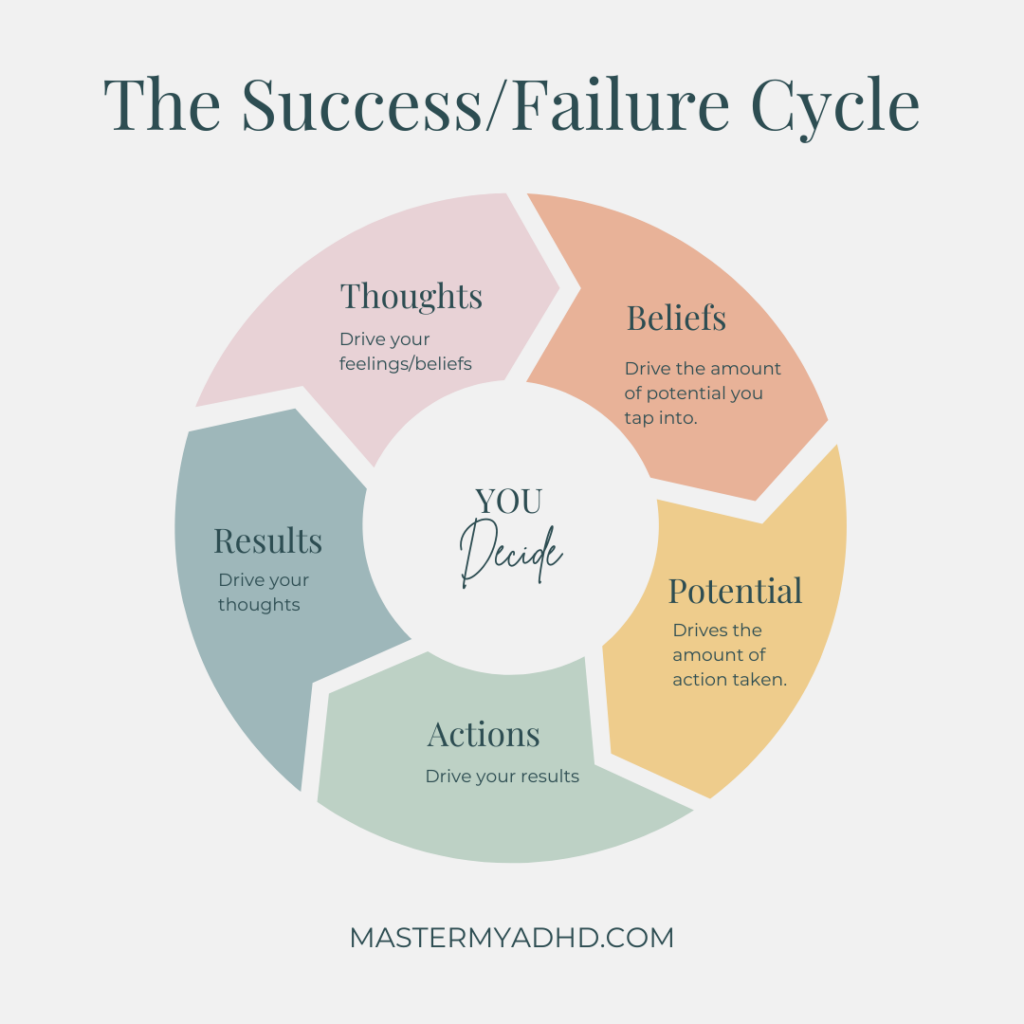
Ever started something with the belief that it’s going to fail, only to see it spiral out of control and lead to exactly what you feared? If so, you understand the role that beliefs can play in determining success or failure. The fear of failure can become a self-fulfilling prophecy if belief aligns with the outcome too often. If you have lived with ADHD (especially undiagnosed) you may have experienced more bumps in the road that resulted in a reason to expect a less desirable outcome. In both business and personal life for all people, self-belief isn’t a guarantee of success, but self-doubt and disbelief can greatly increase the chances of leading to failure. In this post, we’ll explore positive self-belief can break the cycle of failure with the added challenge of ADHD.
The power of self-belief
We all know that self-belief is important, but why? Believe it or not, it has a lot to do with something called the ‘Pygmalion Effect’. The Pygmalion Effect is a theory that states that positive expectations of an individual can drive their performance higher. So, if you believe in yourself and your abilities, you’re more likely to achieve your goals.
On the other hand, self-doubt can become a self-fulfilling prophecy. When you don’t believe in yourself, you’re less likely to take necessary risks, more likely to give up easily, and less likely to put in the effort needed to succeed.
Self-doubt stems from limiting beliefs. Limiting beliefs stem from our thoughts. Science proves that over 95% of what we think each day is repetitive. It’s the repetitive negative beliefs that hold us back from taking risks and pursuing new opportunities.
Here is a list some common limiting beliefs:
- I am too old or I am too young
- I am not smart (or educated) enough
- I know I am going to fail
- You have to have money to make money
- I don’t think I deserve it
- I am a victim of circumstances
- It is too hard, I quit
- Life happens to me (fate)
Our beliefs and values exist at the sub-conscious level, and that’s why they are hardest to change. This is true for all people. With ADHD you may have also struggled with increased impulsive behaviors, academic struggles, and social challenges as well. This may have caused parents, teachers, peers, and coworkers to more critical than they are to others. Some experts, like William Dodson, M.D., estimate that children with ADHD receive a full 20,000 more negative messages by age 10, on average. These messages contribute to ones self-concept and can travel with them through adulthood.
Research indicates the disproportionate amount of criticism of those with ADHD might also result in a higher sensitivity to it, leading to greater avoidance of situations where they may be criticized or punished, or fail.
So, what can you do to break the cycle of failure?
Recognize Negative Self-Talk
We all have a voice in our head that tells us we’re not good enough, but acknowledging it can help you shut it down. One technique that can help is cognitive restructuring. This means challenging negative thoughts and replacing them with more positive or accepting ones. So, if your inner voice says ‘I’m not good enough to do this’, challenge it by saying ‘I am good enough to do this, and I will do my best to succeed’.
Directed Abstraction Technique
Thinking more positively in the classic sense, using statements such as I am enough, I am lovable, or I am successful may actually make you feel worse if not done correctly. These methods may work for some but they don’t always work for those that they are intended for…those that already struggle with low self esteem. This is because positive affirmations and thoughts will never help if your brain doesn’t believe it in the first place.
Instead use a the directed abstraction technique. This is done by using an actual personal success to support a more positive, general view of yourself.
In this technique you complete the following statement: “This went well today, because I am _____.” For example, “my speech went well today because I am a good speaker” or “my team hit our goal because I am a good leader”
It works because the first part of the statement is proof for the second part. So this time your brain will believe it. Research has shown that it can boost self-esteem quickly if done regularly and improve self-belief which can break that cycle of failure.
View Failure As Opportunity to Learn
Despite our best efforts, failure is bound to happen at some point. But remember, your past is not equal to your future. You need make continuous effort to unlock your true potential. I totally believe that we can achieve our goals if we set our mind to them. However, sometimes people are unable to tap into their own full potential, why? Because of limited beliefs, which breeds a limited mindset, which in turn produces negative attitude and doesn’t allow them to tap into their full potential.
Take the lessons from past challenges to adjust and progress. You have unique strengths that you can leverage and without failure you wouldn’t know what success was. It’s OK to fail. It’s what you do with it that matters.
Surround Yourself with Positivity
The company we keep greatly influences our mindset and beliefs. Surround yourself with supportive and positive individuals who will lift you up and encourage you to pursue your goals. Seek out mentorship or networking opportunities to connect with individuals who have succeeded in your desired field. Don’t let negative people take up space in your head. Raise the rent and serve them the eviction notice. You’ll be surprised how a little bit of positivity can impact your perspective and drive.

Beliefs play a crucial role in our path to success. Success is not one giant event, it is all the small things put together (same with failure). Investing in positive thinking and self-belief can lead to contagious momentum and ultimately, success. By combating self-doubt using directed abstraction, surrounding ourselves with positivity, and leaning into the lessons learned from failure, we can use the power of positive self-belief to break the cycle of failure and achieve our goals.
Remember, belief may not guarantee success, but disbelief will surely lead to failure. So why not bet on yourself and start believing in your capabilities today?
For more information on how to navigate ADHD with a new or existing diagnosis, please email Kathryn at mastermyadhd@gmail.com or set up a complimentary discovery call.

Comment on this post